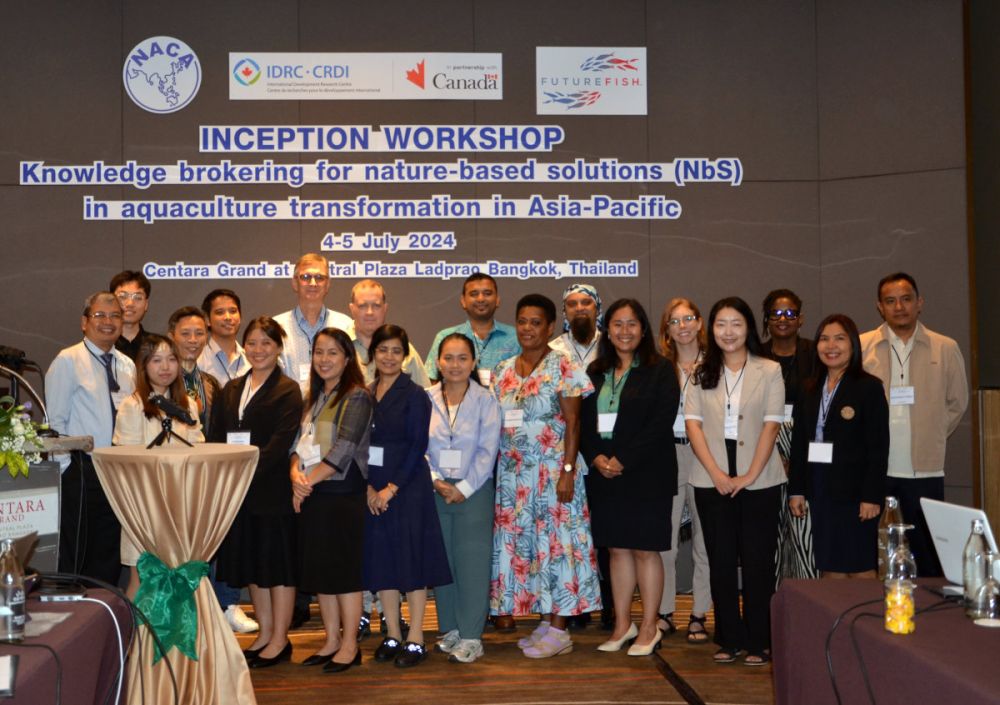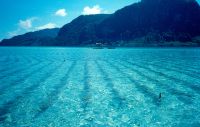Inception workshop: Knowledge brokering for nature-based solutions in aquaculture transformation
9 July 2024 | 3738 views | Better management practices, Emerging Global Issues, Environment and Sustainability, Freshwater finfish, Gender, Livelihoods, gender and social issues, Marine finfish, Molluscs (shellfish and other), Philippines, Thailand

Canada's International Development Research Centre (IDRC) is sponsoring the project "Knowledge Brokering for Nature-Based Solutions in Aquaculture Transformation in Asia-Pacific: Support to the Aquaculture Innovation and Investment Hub." The project's inception workshop was held in Bangkok from July 4-5, bringing together project teams from Thailand, The Philippines, and Fiji to discuss approaches and methodologies. The workshop was opened by Dr. Eduardo Leano, NACA Director General, with welcome remarks by Mike Phillips of FutureFish, a co-investigator of the project, and Rebecca McMillan from IDRC.
This project contributes to NACA's recent work with the FAO on aquaculture transformation. FAO and NACA have published a white paper, developed through extensive consultations, that provides a vision for transforming Asia-Pacific aquaculture by 2030. The aim is to create more efficient, inclusive, resilient, and sustainable food systems through innovation, investment, and partnerships. NACA is developing an Aquaculture Innovation and Investment Hub (AIIH) to help realise this vision in the region, providing a facility that will bring together innovators, startups, and investors to accelerate transformation.
The project is part of a wider IDRC AQUADAPT initiative, a four-year partnership running from 2023-2027. AQUADAPT addresses the intertwined challenges of climate change, biodiversity loss, and food insecurity through applied research on nature-based solutions in aquaculture in Southeast Asia and the Pacific region. AQUADAPT emphasises Gender Equality and Social Inclusion (GESI), ensuring that nature-based solutions are inclusive of all genders and marginalised groups.
The project will contribute to developing National Innovation and Investment Plans for Thailand, The Philippines, and Fiji and the development of the hub. As a first step, the project teams will conduct a baseline assessment of the current aquaculture industry structure, performance, policies, innovation and investment activities, status, and needs. This scoping study will address challenges including:
- Climate change.
- Disease prevention and management.
- Environmental sustainability.
- Gender equality and social inclusion.
- Resource utilisation and management.
Country teams will consult widely with the private sector and authorities to identify important innovations in aquaculture, particularly nature-based solutions, that can mitigate challenges, create efficiencies, open new opportunities, or enhance gender equality and social inclusion. This is expected to result in the identification and documentation of innovations, including nature-based solutions, and their adoption.
Each participating country will focus on different aspects of aquaculture based on local contexts. In Fiji, the assessment will cover the whole aquaculture industry due to its relatively small size. The Philippines and Thailand will focus on specific sub-sectors. For example, the Philippines will concentrate on tilapia, milkfish, and seaweed, which are the largest aquaculture sectors nationally and have the most significant economic and livelihood impacts.
The workshop's introductory session included:
- An overview of AQUADAPT by Rebecca McMillan, IDRC.
- An overview of the project by Eduardo Leano, NACA.
- Private sector scoping plans by Mike Phillips, FutureFish.
- Gender Equality and Social Inclusion by Sizwile Khoza, Stockholm Environment Institute.
- Innovations and investment opportunities for nature-based solutions by the project teams from Fiji, the Philippines, and Thailand.
- An overview of the Aquaculture Innovation and Investment Hub.
The remainder of the workshop focused on developing guidelines for conducting baseline assessments for each country. Teams discussed the purpose of the National Innovation and Investment Plans, ways to progress implementation of nature-based solutions, and key factors in developing the baseline assessments. They also discussed guidelines for integrating gender equity and social inclusion.
A discussion was held on the private sector scoping activities and an innovation event, which will be held in January 2025 for startups and small and medium enterprises. This event will help businesses realise their ideas in nature-based solutions, overcome key challenges, and access emerging opportunities.
The final methodology for baseline assessments is expected to be ready by the end of August, with fieldwork taking place from September to December. The project's findings will be shared at the next High-Level Meeting in April 2025 in Shanghai, China, and with other AQUADAPT projects.
NACA extends its gratitude to the International Development Research Institute for their financial support, FutureFish, the Stockholm Environment Institute, and the project teams from Fiji, Thailand, and the Philippines for their contributions and collaboration.
Creative Commons Attribution.
